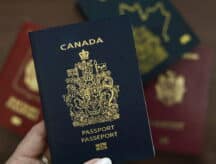FAQ: New PR streams for essential workers, international student graduates in Canada
As part of an initiative to meet immigration targets amid travel restrictions, Canada is launching six new limited-time immigration programs to essential workers and international student graduates who are working in Canada.
There has been much interest in the new programs, as they are open to a wide range of candidates. Generally speaking, to apply you need to be working in an eligible occupation in Canada or have recently graduated from an eligible educational program, meet language requirements, among other criteria.
Immigration, Refugees and Citizenship Canada (IRCC) will release a guide on what information candidates will need to submit. What we know about the programs now, is based on the public policies on the IRCC webpage, as well as briefing notes from an April 21 meeting between IRCC and three associations representing immigration lawyers and consultants.
Here are some answers to frequently asked questions on the new programs for essential workers and international graduates. CIC News will update this story as more information comes available.
How can I apply?
Applications will be done online.
The application process will be based on a first in first out principle.
The first step is to check your eligibility. There are different requirements for each of the programs for essential workers, graduates, as well as French-speaking essential workers, and graduates.
At the time of applying, you will have to submit a completed application in its entirety, with all fees paid in order to be approved for permanent residence. This includes language test documents. You will also have to be working at the time of your application, and you cannot be on leave for medical, maternity, or otherwise.
Do you live in Canada? Apply for PR under these news pathways!
What documents will I need?
For these programs, IRCC can only refuse or approve applications. This is why you have to submit everything at once, because the department may not be able to give you a second chance to send in a completed application. There may be situations where IRCC will request additional documents. There may also be a possibility to submit documents that are more difficult to obtain at a later date, such as police certificates, as long as you can prove you have made a reasonable effort to get them.
The documents required for the new programs will be published in the application guide. IRCC says to look at the Canadian Experience Class application guide for hints.
There is going to be a "How to Apply Tool" which will help you decide which stream to apply for. Then you will be led to create an account. You will see a document checklist. The first required document will be a generic immigration application form called an IMM 0008 (IRCC will release a new version of this document for the new streams). You need Adobe Acrobat Reader to fill out and validate the form. IRCC says it is important that these forms are validated and submitted with 2D barcodes.
The subsequent documents will include proof of eligibility criteria, such as proof of studies in Canada, or a study permit for example. Language test documents that have been taken within the past two years must be uploaded at the time of submission. You will also need to upload copies of your education credential if you are applying for the international graduate streams.
There will be an acknowledgement and consent form, a privacy statement, then you will land on a page which confirms your submission.
You will be able to view what you uploaded after you have submitted your application
How long is the processing time?
IRCC is aiming to process these new streams in six months, but has not set a processing standard yet.
How will the intakes be counted if people are eligible for more than one stream?
You choose up front which program you are applying for. Intake caps will be counted by the number of times the "Submission Button" is pressed. IRCC is planning to have a counter on the main page to track the number of submissions.
Can I apply to multiple streams?
Yes, but then you will have to pay the fees twice.
Do you live in Canada? Apply for PR under these news pathways!
How much are the fees?
Fees are not yet confirmed, but they could range between $1,050 and $1,325. All fees must be paid up front.
Can I apply if I have not graduated?
Yes. For the essential worker streams, current employment in any occupation is eligible and it does not have to be full time. Students can apply under these streams as long as they have eligible work experience that meets the 1,560 hour requirement within the three years leading up to the application date.
Can I apply if I live in Quebec?
Part of the eligibility for the new pathways is that applicants must intend to immigrate to any province other than Quebec. This is part of an effort to increase French immigration outside of Quebec. Also, Quebec has a special agreement with Canada, which prohibits the federal government from implementing new immigration programs to the province.
However, Quebec education and work experience are still eligible as far as these new programs are concerned. Quebec-based applicants can still qualify, but they may have to answer questions about how they will move, their settlement plan, what they have done to actively look for a job outside the province, or if they have a job offer elsewhere.
Quebec-based applicants may be eligible for one of the province's own immigration streams.
Do I have to be employed in an eligible occupation at the time of my application?
No. At the time of your application you can be employed in any occupation. You just have to have met the work requirement of 1,560 hours in an eligible occupation within the past three years.
There are two streams of eligible essential occupations. Healthcare occupations are listed under Stream A, and other essential occupations are listed under Stream B. If you are applying as a healthcare worker you cannot use Stream B occupations toward your eligibility, but if you are applying as an other essential worker you can count Stream A work experience.
Are medicals required upfront with the application system?
IRCC is currently trying to extend medicals as much as possible during COVID-19 for those in Canada.
For this group, they will be dividing people into two groups: people who have never done medical and people who have done medical. Those who have done medical should provide proof. It is not yet known how old the medical can be. If you can access an Upfront Medical, you may wish to do so nonetheless.
Do you live in Canada? Apply for PR under these news pathways!
© CIC News All Rights Reserved. Visit CanadaVisa.com to discover your Canadian immigration options.
- Do you need Canadian immigration assistance? Contact the Contact Cohen Immigration Law firm by completing our form
- Send us your feedback or your non-legal assistance questions by emailing us at media@canadavisa.com







